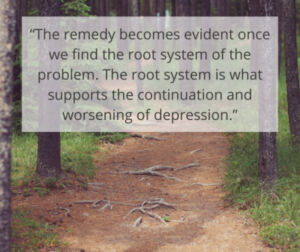Depression is one of the most commonly occurring mental health issues. In fact, the World Health Organization reports that about 5% of men and 9% of women experience symptoms of depression in any given year. In this article, we will explore depression from a traditional medical point of view. We will also examine the relational, spiritual, and faith-related aspects and causes of depression consistent with biblical Scripture.
Presently, we are experiencing an unprecedented time of challenging circumstances. This pesky virus along with mandated social isolation and limitations placed upon individuals is upsetting to many. When we add into this situation an increase in responsibility with fewer resources available in terms of income and services, we have a hotbed for an increase in symptoms of depression and other serious mental health issues.
Sometimes depression occurs for the first time due to a hardship or situation. I would not be surprised to discover a much higher number of both males and females suffering with symptoms of depression and/or an increase in the level of negative symptoms in pre-existing cases. Irvine Christian Counseling offers compassionate support to help individuals navigate these challenges and find hope and healing.
Causes of Depression
 There are a variety of causes of depression and reasons why people become depressed. A mixture of genetics, brain chemistry, and family history each play a role in developing depression. Certain individuals may have a biological predisposition for developing mood issues when faced with overwhelming stressors.
There are a variety of causes of depression and reasons why people become depressed. A mixture of genetics, brain chemistry, and family history each play a role in developing depression. Certain individuals may have a biological predisposition for developing mood issues when faced with overwhelming stressors.
When ample distress has been added to a pre-existing vulnerability, a person is likely to become troubled in areas of mood regulation with symptoms ranging from anxiety to depression or a combination of both.
Underlying medical conditions (such as hormonal or thyroid issues), use of medications or substance abuse (prescription medication, alcohol, marijuana), a lack of adequate nutrition or physical activity, and any pre-existing addictions may all lead to or exacerbate symptoms of depression.
Family history also plays a part in developing depression. For example, research studies indicate that having a grandparent as well as a parent with depression doubles the likelihood of an onset of depression at some point in one’s lifetime.
Experiences of childhood neglect and abuse may also predispose a person to the development of depression at some point during the life span. Secrets and lies are contributors to depression even if you are the only one who knows what you are doing.
Symptoms of Depression
 There is a wide range of assorted symptoms involved in each individual experience of depression. Each person will have a different combination of symptoms which fit one or more types or patterns of depressions.
There is a wide range of assorted symptoms involved in each individual experience of depression. Each person will have a different combination of symptoms which fit one or more types or patterns of depressions.
A person may experience feelings of sadness, emptiness, or hopelessness, fearfulness, irritable mood, or loss of pleasure in all or most daily tasks. Others may experience a loss of interest in sexual intimacy, significant changes in weight, sleep disturbance, significant changes in eating patterns (either loss of appetite or overeating), feelings of agitation or restlessness, or a loss of energy.
Some may experience feelings of worthlessness, difficulty concentrating, recurrent thoughts of death. However, in addition to having several of the above symptoms, an actual diagnosis of depression requires noticeable impairment in one or more areas of life, such as employment problems or problems at home.
Types of Depression
Depression can occur in shorter term episodes or be long lasting. Sometimes depression is accompanied with sadness, anxiety, or extreme changes in mood. Depression can also alternate with manic episodes. In extreme cases, a major depression can be accompanied by psychosis. Depression with psychosis can be caused by substance abuse or arise from a particularly challenging and overwhelming set of circumstances.
Once the root causes of depression are identified, the therapeutic remedy follows the root. Solutions offered are often tied to the mental health professional’s understanding of the nature of depression. One’s professional paradigm or viewpoint often tends to determine the type of treatment prescribed.

For example, a psychiatrist is likely to prescribe medications to address and enhance neurotransmitter functioning. A fitness-oriented mental health professional may focus upon your lifestyle and nutrition as a possible culprit in ongoing depression. In my practice, I take into consideration many possibilities of origin and then match the treatment to the individual’s needs and desires.
Relational and Spiritual Aspects of the Causes of Depression
Relational risks
There are both interpersonal risks as well as intrapersonal risks which contribute to the development of depression. While the word “interpersonal” denotes interactions between two or more individuals, the word “intrapersonal” refers to our relationship within ourselves. Intrapersonal relationship dynamics are often misunderstood or overlooked but are clinically significant contributors to mental health problems.
The most common intrapersonal cause of depression is a pattern of saying “yes” when you genuinely feel inclined to say “no.” Such behavior is an example of self-betrayal, which is not something God asks of us. In fact, when we are following Scriptural guidance our choices will be made from a place of love and not a place of fearful control.
Overriding your intuitive sense of what is occurring or neglecting to determine whether something asked of you is in your best interest undermines and destroys intimacy. This is because a foundation of trust is necessary to establish and maintain healthy intimate relationships. A pattern of ongoing self-betrayal is a recipe for relational disaster. This is one of the first things I pay attention to when getting to know a new client.
Another relational risk contributing to depression occurs when you have a pattern of spending time in the company of people you genuinely dislike or who are unkind or unsafe for you.
Do you tend to over give without receiving in a reciprocal fashion over time? Do you find it difficult to speak up when something matters to you? Is it difficult for you to make your preferences, opinions, and needs a priority?
Are you able to fairly, yet firmly, inform others when you have hit a personal limit or want to establish a boundary to protect your best interest? Difficulties in any of these areas may be fueling or feeding symptoms of depression.
Spiritual risks
Making fear and anxiety-based decisions from your head that do not take into consideration the wisdom and knowledge of your body can lead to anxiety and depression.
It is therefore of utmost importance to be involved in an ongoing process of being changed by the renewing of your mind through exposing yourself to truthful and accurate streams of information, such as reading your Bible on a regular basis and attending services wherein the Word of God is spoken. God tells us to be “transformed by the renewing of our minds,” which involves placing yourself in front of reliable sources of truth.
“Do not copy the behavior and customs of this world, but let God transform you into a new person by changing the way you think. Then you will learn to know God’s will for you, which is good and pleasing and perfect.” – Romans 12:2, NLT

Spiritual causes of mental health concerns often involve a kind of misalignment with truth and honor. When we tune into the fearful channel of deception or repeatedly behave in ways that violate our own sense of right and wrong, we become unable to see, hear, or discern truth. Then we tend resort to ill-advised attempts at controlling others, becoming even more small-minded in the process of manipulation.
Maybe during times of disagreement, we tend to resort to sarcastic puts downs of self and others. Or perhaps we engage in name calling, use exaggeration, portray a sense of entitlement, or are generally unsafe people in relationship with others. The antidote to this kind of depression is to root out deception and tune into the faith channel made available to each of us by the grace and mercy of God.
Lifestyle Risks
Other often overlooked contributors to depression include what I refer to as lifestyle risks. As previously mentioned in this article, alcohol and substance abuse contribute to the likelihood of developing depression, as do addictions such as gambling, pornography, binge eating or substance abuse, and prescription medications. Behaving badly, dishonoring agreements, a lack of proper and adequate self-care, being involved in deception, and living a secret life are all ingredients in a recipe for mood disorders and especially symptoms of depression.
Christian Counseling for Depression
In summary, there can be many different causes of a depressed mood and sometimes it may not be preventable. Other causes of depression could be situational or related to loss.
In my clinical practice, we will first look for any biological basis for your pattern of symptoms. From there, we will also examine your lifestyle and nutritional habits. Then we will carefully examine your relationships with others, yourself, and God for areas of misalignment. Please come back next month to read a follow-up article addressing the treatment and resolution of depression from a faith-based perspective.
Feel free to contact me or one of the other practitioners listed in the counselor directory to schedule an appointment. Irvine Christian Counseling is here to provide the care and support you need.
“Alone,” courtesy of Jude Beck, unsplash.com, CC0 License; “Solo beach walk,” courtesy of Saksham Gangwar, unsplash.com, CC0 License
-
Kate Motaung: Curator
Kate Motaung is the Senior Writer, Editor, and Content Manager for a multi-state company. She is the author of several books including Letters to Grief, 101 Prayers for Comfort in Difficult Times, and A Place to Land: A Story of Longing and Belonging...
DISCLAIMER: THIS ARTICLE DOES NOT PROVIDE MEDICAL ADVICE
Articles are intended for informational purposes only and do not constitute medical advice; the Content is not intended to be a substitute for professional medical advice, diagnosis, or treatment. All opinions expressed by authors and quoted sources are their own and do not necessarily reflect the opinions of the editors, publishers or editorial boards of Irvine Christian Counseling. This website does not recommend or endorse any specific tests, physicians, products, procedures, opinions, or other information that may be mentioned on the Site. Reliance on any information provided by this website is solely at your own risk.





